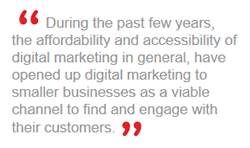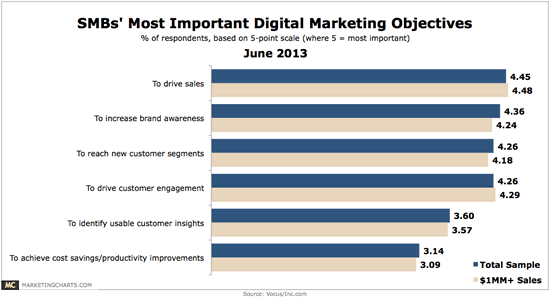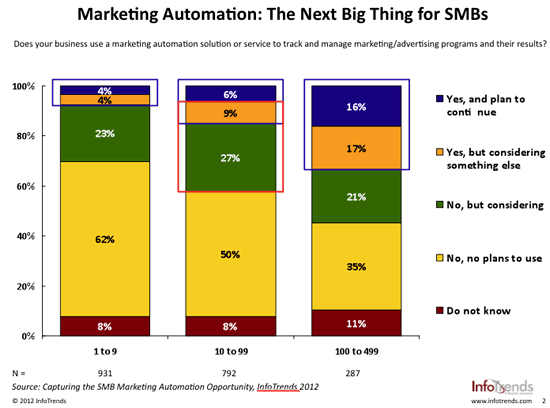 In the “2013 Inc. Digital Marketing Survey”, Vocus and Inc. share their findings on the “state of digital marketing for SMBs”. Email marketing plays an important role and, although the website still reigns, the more connected and integrated digital marketing mix becomes apparent.
In the “2013 Inc. Digital Marketing Survey”, Vocus and Inc. share their findings on the “state of digital marketing for SMBs”. Email marketing plays an important role and, although the website still reigns, the more connected and integrated digital marketing mix becomes apparent.
For the record: the report defines SMBs as businesses with $1 million or more in annual sales revenue, to put it in perspective for people living in smaller markets such as myself.
The main digital “channel” used by SMBs is the website with 86.6% of respondents. The website is also rated as the most effective part of the digital marketing mix of SMBs. The report ranks social media second (77.3% of respondents) from an effectiveness perspective but we need to be careful with that number, for many reasons.
Email marketing ranks high, especially in larger SMBs
Although email marketing for marketing/promotion is ranked third from that same effectiveness perspective, email marketing is also ranked as the 5th most effective channel when used for customer service. Vocus and Inc. mention email marketing a third time, for prospecting.
Here are the percentages regarding the use of email marketing:
- Email for marketing/promotion: used by 65.8% of respondents.
- Email for customer service: 61.3%.
- Email for prospecting: 48.2%.
Important: SMBs with +$1MM sales rate email for marketing/promotion as the second most effective tactic, followed by search engine optimization. In the overall results, search engine optimization is the 4th. most effective digital marketing tactic, as rated by respondents.
Content marketing is for SMBs too
While content marketing isn’t mentioned as a separate set of tactics and techniques, it’s also playing an important role in the SMB space. Other research has looked at the role of content marketing, inbound marketing, etc. among SMBs but as both really are umbrella terms, it’s maybe better to dive deeper into the data ourselves to gauge the role of content.
It’s clear content plays an essential role in all main tactics: on the website, in social media, in email marketing and of course in SEO. Although it’s certainly not true that SEO equals content marketing nowadays, content is more essential than ever in search and being found in general, certainly with Google’s ongoing changes (and the “new” Penguin).
Tools, channels and tactics that we traditionally classify as content marketing (and also inbound marketing, but again, both are umbrella terms), rank well too.
Business blogs and white papers are used by 52.7% of all respondents. Videos and photos do well and online events (webinars) are used by little over a quarter of respondents.
Digital marketing success: sales and leads please
More important than tools, tactics and channels are the digital marketing goals of SMBs and, as could be expected, they focus more on direct results. Simply said: driving sales – and thus also generating and nurturing leads – is the number one priority.
When asked what marketing success looks like in digital, most respondents answer sales as well. Leads come in second but they are far more important among larger SMBs. Search rank is the third indicator of success, according to the report.

Looking at the future, digital marketing spend will grow significantly as could be expected. Given the fact that some tactics are expected to grow as well, it seems that the demand for more integrated digital marketing solutions will grow in the SMB space as well. I guess that in larger SMBs the need to align sales and marketing and the integration of digital platforms and CRM grows as well.
Growing opportunities for integrated digital marketing solutions and marketing automation
While many email service providers nowadays offer integration with social, CRM and the far less used mobile marketing in the SMB market, it’s a well-known fact that marketing automation is increasingly adopted here as well as the InfoTrends chart below shows.

One of the vendors that comes to mind in that regard is HubSpot (dislaimer: I’m a HubSpot partner) but there certainly are other options too. Marketo has Spark, for instance. There are also low-cost solutions. Think about LoopFuse, which I’ve been trying for a while, Infusionsoft and Leadsius (even with a free version) to name just a few.
The fact that Vocus, with its’ software for social, search, email and PR, researches the SMB space is probably not a coincidence either.
Furthermore, given the competition in the marketing automation space, I expect some vendors to either adapt pricing for SMBs or even to launch “light” version in order to tap the SMB market.
You can get the Vocus and Inc. report here.
Let me know what you think as I’m less familiar with the SMB market and am interested to know what evolutions you see and expect.
Originally posted on Social Email Marketing and moved as part of a migration.

